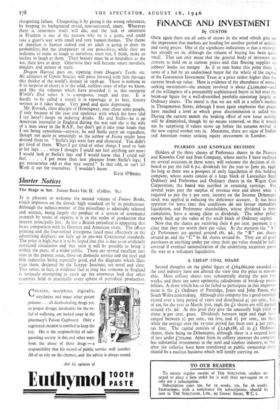FINANCE AND INVESTMENT
By CUSTOS
ONCE again there are all sorts of straws in the wind which give me the impression that markets are heading for another period of activity and rising prices. One of the significant indications is that a recovery has already set in, although the volume of buying has been quite small. That can only mean that the general body of investors are content to hold on at current prices and that floating supplies on jobbers' books are meagre. As if to ram home this point there ;s news of a bid by an undisclosed buyer for the whole of the capital of the Conversion Investment.Trust at a price rather higher than the current break-up value. Here is evidence of the abundance of money seeking investment—the amount involved is about £3,500s000—and of the willingness of a presumably sophisticated buyer to bid over the break-up figure for a well-diversified portfolio consisting largely of Ordinary shares. The moral is that we are, still in a seller's market in Throgmorton Street, although I must again emphasise that prices have reached a level at which great discrimination is called for. During the current month the braking effect of new issue activity will be diminished, though by no means removed, so that it would not be surprising if values move up before the autumn revival n the new capital market sets in.. Meantime, there are signs of Indian and American money seeking equity investment in London.
PEARSON AND KNOWLES DECISION
Holders of the three classes of Preference shares in the Pearson and Knowles Coal and Iron Company, whose merits I have outlined on several occasions in these notes, will welcome the decision of tht. board to pay the full 6 p.c. dividends for the year to June 30, 1946. So long as there was a prospect of early liquidation of this holding company, whose assets consist of a large block of Lancashire Steel Ordinary and Preference and Ordinary shares in the Wigan Coal Corporation, the board was justified in retaining earnings. For several years past the surplus of revenue over and above what 's required to pay the 5 per cent. interest on the Income Debenture stock was applied in reducing the deficiency account. It his been apparent for some time that conditions do not favour immediate liquidation, and Preference shareholders, whose dividend is non- cumulative, have a strong claim to dividends. The other policy merely built up the value of the small block of Ordinary capital.
Now that the shares are receiving their 6 per cent. payment it is clear that they are worth their par value. At the moment the " A " Li Preferences are quoted around 18s. 9d., the "B" ios. shares around 9s. and the "C" 6s. 8d. shares around 6s. They are all good purchases at anything under par since their par value should be fully covered if eventual nationalisation of the underlying securities paves the way to a voluntary liquidation.
A CHEAP COAL SHARE Second thoughts on the global figure of L164,660,000 awarded ta the coal industry have not altered the view that the price is reason- able. Most colliery shares rose substantially during the past few weeks, and there are some optimistic calculations of break-up possi- bilities. A share which has so far failed to participate in this improve- ment is the £t Ordinary of Partridge, Jones and John Paton, the South Wales undertaking. Although this company has a good earnings record over a long period of years and distributed 44 per cent., free of tax, for the year to March 31st, 1946, the La shares are still quoted around 17s. 9d. At this level they give the unusually high yield at about 9 per cent. gross. Dividends between 1936 and 1946 have ranged between 31 per cent., tax free, and 64 per cent., tax free, while the average over the It-year period has been over 4 per cent., tax free. The capital consists of £2,146,188, all in LI Ordinary shares, there being no Debentures, although there is a secured loan of just under £700,000. Apart from its colliery interests the company has substantial investments in the steel and tinplate industry, so that after the colleries have been transferred to public ownership there should be a nucleus business which will justify carrying on.


























 Previous page
Previous page